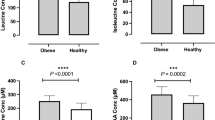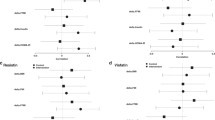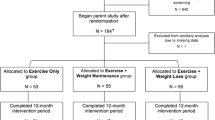Abstract
Background/Objectives:
Recent work suggests that macronutrients are pro-inflammatory and promote oxidative stress. Reports of postprandial regulation of total adiponectin have been mixed, and there is limited information regarding postprandial changes in high molecular weight (HMW) adiponectin. The aim of this study was to assess the effect of a standardised high-fat meal on metabolic variables, adiponectin (total and HMW), and markers of inflammation and oxidative stress in: (i) lean, (ii) obese non-diabetic and (iii) men with type 2 diabetes mellitus (T2DM).
Subjects/Methods:
Male subjects: lean (n=10), obese (n=10) and T2DM (n=10) were studied for 6 h following both a high-fat meal and water control. Metabolic variables (glucose, insulin, triglycerides), inflammatory markers (interleukin-6 (IL6), tumour necrosis factor (TNF)α, high-sensitivity C-reactive protein (hsCRP), nuclear factor (NF)κB expression in peripheral blood mononuclear cells (p65)), indicators of oxidative stress (oxidised low density lipoprotein (oxLDL), protein carbonyl) and adiponectin (total and HMW) were measured.
Results:
No significant changes in TNFα, p65, oxLDL or protein carbonyl concentrations were observed. Overall, postprandial IL6 decreased in subjects with T2DM but increased in lean subjects, whereas hsCRP decreased in the lean cohort and increased in obese subjects. There was no overall postprandial change in total or HMW adiponectin in any group. Total adiponectin concentrations changed over time following the water control, and the response was significantly different in lean subjects compared with subjects with T2DM (P=0.04).
Conclusions:
No consistent significant postprandial inflammation, oxidative stress or regulation of adiponectin was observed in this study. Findings from the water control suggest differential basal regulation of total adiponectin in T2DM compared with lean controls.
This is a preview of subscription content, access via your institution
Access options
Subscribe to this journal
Receive 12 print issues and online access
We are sorry, but there is no personal subscription option available for your country.
Buy this article
- Purchase on SpringerLink
- Instant access to full article PDF
Prices may be subject to local taxes which are calculated during checkout




Similar content being viewed by others
References
Aljada A, Mohanty P, Ghanim H, Abdo T, Tripathy D, Chaudhuri A et al. Increase in intranuclear nuclear factor kappa B and decrease in inhibitor kappa B in mononuclear cells after a mixed meal: evidence for a proinflammatory effect. Am J Clin Nutr 2004; 79: 682–690.
Ceriello A, Assaloni R, Da Ros R, Maier A, Piconi L, Quagliaro L et al. Effect of atorvastatin and irbesartan, alone and in combination, on postprandial endothelial dysfunction, oxidative stress, and inflammation in type 2 diabetic patients. Circulation 2005; 111: 2518–2524.
Ceriello A, Bortolotti N, Motz E, Crescentini A, Lizzio S, Russo A et al. Meal-generated oxidative stress in type 2 diabetic patients. Diabetes Care 1998; 21: 1529–1533.
Ceriello A, Taboga C, Tonutti L, Quagliaro L, Piconi L, Bais B et al. Evidence for an independent and cumulative effect of postprandial hypertriglyceridemia and hyperglycemia on endothelial dysfunction and oxidative stress generation: effects of short- and long-term simvastatin treatment. Circulation 2002; 106: 1211–1218.
Aljada A, Friedman J, Ghanim H, Mohanty P, Hofmeyer D, Chaudhuri A et al. Glucose ingestion induces an increase in intranuclear nuclear factor kappa B, a fall in cellular inhibitor kappa B, and an increase in tumor necrosis factor alpha messenger RNA by mononuclear cells in healthy human subjects. Metabolism 2006; 55: 1177–1185.
Mohanty P, Ghanim H, Hamouda W, Aljada A, Garg R, Dandona P . Both lipid and protein intakes stimulate increased generation of reactive oxygen species by polymorphonuclear leukocytes and mononuclear cells. Am J Clin Nutr 2002; 75: 767–772.
Evans M, Anderson RA, Graham J, Ellis GR, Morris K, Davies S et al. Ciprofibrate therapy improves endothelial function and reduces postprandial lipemia and oxidative stress in type 2 diabetes mellitus. Circulation 2000; 101: 1773–1779.
Patel C, Ghanim H, Ravishankar S, Sia CL, Viswanathan P, Mohanty P et al. Prolonged reactive oxygen species generation and nuclear factor-{kappa} B activation following a high fat high carbohydrate meal in the obese. J Clin Endocrinol Metab 2007; 92: 4476–4479.
Assaloni R, Da Ros R, Quagliaro L, Piconi L, Maier A, Zuodar G et al. Effects of S21403 (mitiglinide) on postprandial generation of oxidative stress and inflammation in type 2 diabetic patients. Diabetologia 2005; 48: 1919–1924.
Bell DS, O'Keefe JH, Jellinger P . Postprandial dysmetabolism: the missing link between diabetes and cardiovascular events? Endocr Pract 2008; 14: 112–124.
Whitehead JP, Richards AA, Hickman IJ, Macdonald GA, Prins JB . Adiponectin--a key adipokine in the metabolic syndrome. Diabetes Obes Metab 2006; 8: 264–280.
Richards AA, Stephens T, Charlton HK, Jones A, Macdonald GA, Prins JB et al. Adiponectin multimerization is dependent on conserved lysines in the collagenous domain: evidence for regulation of multimerization by alterations in posttranslational modifications. Mol Endocrinol 2006; 20: 1673–1687.
Greenfield JR, Samaras K, Hayward CS, Chisholm DJ, Campbell LV . Beneficial postprandial effect of a small amount of alcohol on diabetes and cardiovascular risk factors: modification by insulin resistance. J Clin Endocrinol Metab 2005; 90: 661–672.
Shimabukuro M, Chinen I, Higa N, Takasu N, Yamakawa K, Ueda S . Effects of dietary composition on postprandial endothelial function and adiponectin concentrations in healthy humans: a crossover controlled study. Am J Clin Nutr 2007; 86: 923–928.
Esposito K, Nappo F, Giugliano F, Di Palo C, Ciotola M, Barbieri M et al. Meal modulation of circulating interleukin 18 and adiponectin concentrations in healthy subjects and in patients with type 2 diabetes mellitus. Am J Clin Nutr 2003; 78: 1135–1140.
Rubin D, Helwig U, Nothnagel M, Lemke N, Schreiber S, Folsch UR et al. Postprandial plasma adiponectin decreases after glucose and high fat meal and is independently associated with postprandial triacylglycerols but not with - 11388 promoter polymorphism. Br J Nutr 2007; 99: 76–82.
Annuzzi G, Bozzetto L, Patti L, Santangelo C, Giacco R, Di Marino L et al. Type 2 diabetes mellitus is characterized by reduced postprandial adiponectin response: a possible link with diabetic postprandial dyslipidemia. Metabolism 2010; 59: 567–574.
Stirban A, Negrean M, Gotting C, Uribarri J, Gawlowski T, Stratmann B et al. Dietary advanced glycation endproducts and oxidative stress: in vivo effects on endothelial function and adipokines. Ann N Y Acad Sci 2008; 1126: 276–279.
Stirban A, Negrean M, Stratmann B, Gotting C, Salomon J, Kleesiek K et al. Adiponectin decreases postprandially following a heat-processed meal in individuals with type 2 diabetes: an effect prevented by benfotiamine and cooking method. Diabetes Care 2007; 30: 2514–2516.
Yamauchi J, Osawa H, Takasuka T, Ochi M, Murakami A, Nishida W et al. Serum resistin is reduced by glucose and meal loading in healthy human subjects. Metabolism 2008; 57: 149–156.
Peake PW, Kriketos AD, Campbell LV, Shen Y, Charlesworth JA . The metabolism of isoforms of human adiponectin: studies in human subjects and in experimental animals. Eur J Endocrinol 2005; 153: 409–417.
Phillips LK, Peake JM, Zhang X, Hickman IJ, Kolade O, Sacre JW et al. The effect of a high-fat meal on postprandial arterial stiffness in men with obesity and type 2 diabetes. J Clin Endocrinol Metab 2010; 95: 4455–4459.
Colman PG, Thomas DW, Zimmet PZ, Welborn TA, Garcia-Webb P, Moore MP . New classification and criteria for diagnosis of diabetes mellitus. Position Statement from the Australian Diabetes Society, New Zealand Society for the Study of Diabetes, Royal College of Pathologists of Australasia and Australasian Association of Clinical Biochemists. Med J Aust 1999; 170: 375–378.
Ghosh S, Meister D, Cowen S, Hannan WJ, Ferguson A . Body composition at the bedside. Eur J Gastroenterol Hepatol 1997; 9: 783–788.
Rose FJ, Webster J, Barry JB, Phillips LK, Richards AA, Whitehead JP . Synergistic effects of ascorbic acid and thiazolidinedione on secretion of high molecular weight adiponectin from human adipocytes. Diabetes Obes Metab 2010; 12: 1084–1089.
Gavrila A, Peng CK, Chan JL, Mietus JE, Goldberger AL, Mantzoros CS . Diurnal and ultradian dynamics of serum adiponectin in healthy men: comparison with leptin, circulating soluble leptin receptor, and cortisol patterns. J Clin Endocrinol Metab 2003; 88: 2838–2843.
Calvani M, Scarfone A, Granato L, Mora EV, Nanni G, Castagneto M et al. Restoration of adiponectin pulsatility in severely obese subjects after weight loss. Diabetes 2004; 53: 939–947.
Manning PJ, Sutherland WH, Hendry G, de Jong SA, McGrath M, Williams SM . Changes in circulating postprandial proinflammatory cytokine concentrations in diet-controlled type 2 diabetes and the effect of ingested fat. Diabetes Care 2004; 27: 2509–2511.
Nappo F, Esposito K, Cioffi M, Giugliano G, Molinari AM, Paolisso G et al. Postprandial endothelial activation in healthy subjects and in type 2 diabetic patients: role of fat and carbohydrate meals. J Am Coll Cardiol 2002; 39: 1145–1150.
Carroll MF, Schade DS . Timing of antioxidant vitamin ingestion alters postprandial proatherogenic serum markers. Circulation 2003; 108: 24–31.
Dixon NC, Hurst TL, Talbot DC, Tyrrell RM, Thompson D . Active middle-aged men have lower fasting inflammatory markers but the postprandial inflammatory response is minimal and unaffected by physical activity status. J Appl Physiol 2009; 107: 63–68.
Payette C, Blackburn P, Lamarche B, Tremblay A, Bergeron J, Lemieux I et al. Sex differences in postprandial plasma tumor necrosis factor-alpha, interleukin-6, and C-reactive protein concentrations. Metabolism 2009; 58: 1593–1601.
Dickinson S, Hancock DP, Petocz P, Ceriello A, Brand-Miller J . High-glycemic index carbohydrate increases nuclear factor-kappaB activation in mononuclear cells of young, lean healthy subjects. Am J Clin Nutr 2008; 87: 1188–1193.
Macias-Gonzalez M, Cardona F, Queipo-Ortuno M, Bernal R, Martin M, Tinahones FJ . PPARgamma mRNA expression is reduced in peripheral blood mononuclear cells after fat overload in patients with metabolic syndrome. J Nutr 2008; 138: 903–907.
Neri S, Calvagno S, Mauceri B, Misseri M, Tsami A, Vecchio C et al. Effects of antioxidants on postprandial oxidative stress and endothelial dysfunction in subjects with impaired glucose tolerance and Type 2 diabetes. Eur J Nutr 2010; 49: 409–416.
Fernandez-Real JM, Garcia-Fuentes E, Moreno-Navarrete JM, Murri-Pierri M, Garrido-Sanchez L, Ricart W et al. Fat overload induces changes in circulating lactoferrin that are associated with postprandial lipemia and oxidative stress in severely obese subjects. Obesity (Silver Spring) 2010; 18: 482–488.
Orban Z, Remaley AT, Sampson M, Trajanoski Z, Chrousos GP . The differential effect of food intake and beta-adrenergic stimulation on adipose-derived hormones and cytokines in man. J Clin Endocrinol Metab 1999; 84: 2126–2133.
Jimenez-Gomez Y, Lopez-Miranda J, Blanco-Colio LM, Marin C, Perez-Martinez P, Ruano J et al. Olive oil and walnut breakfasts reduce the postprandial inflammatory response in mononuclear cells compared with a butter breakfast in healthy men. Atherosclerosis 2009; 204: e70–e76.
van Oostrom AJ, Sijmonsma TP, Verseyden C, Jansen EH, de Koning EJ, Rabelink TJ et al. Postprandial recruitment of neutrophils may contribute to endothelial dysfunction. J Lipid Res 2003; 44: 576–583.
Acknowledgements
We thank Mr Goce Dimeski, Clinical Biochemistry Princess Alexandra Hospital, Brisbane, Australia, for his help with biochemical analyses; Louise Cooney, Diamantina Institute, the University of Queensland, Brisbane, Australia, for her help with clinical studies. This research was supported by participation from the 50+ Registry of the Australasian Centre on Ageing, the University of Queensland, Brisbane, Australia. The following grants and fellowships supported the writing of this paper: National Health and Medical Research Council, Australia; Princess Alexandra Foundation, Brisbane, Australia; GlaxoSmithKline Postgraduate Support Grant.
Author information
Authors and Affiliations
Corresponding author
Ethics declarations
Competing interests
The authors declare no conflict of interest.
Rights and permissions
About this article
Cite this article
Phillips, L., Peake, J., Zhang, X. et al. Postprandial total and HMW adiponectin following a high-fat meal in lean, obese and diabetic men. Eur J Clin Nutr 67, 377–384 (2013). https://doi.org/10.1038/ejcn.2013.49
Received:
Revised:
Accepted:
Published:
Issue Date:
DOI: https://doi.org/10.1038/ejcn.2013.49
Keywords
This article is cited by
-
Effects of a single phosphate-enriched test meal on inflammasome activity and postprandial inflammatory markers in healthy subjects
European Journal of Nutrition (2024)
-
Influence of a proinflammatory state on postprandial outcomes in elderly subjects with a risk phenotype for cardiometabolic diseases
European Journal of Nutrition (2022)
-
Postprandial leptin and adiponectin in response to sugar and fat in obese and normal weight individuals
Endocrine (2019)
-
Modulation of obesity-induced inflammation by dietary fats: mechanisms and clinical evidence
Nutrition Journal (2014)



